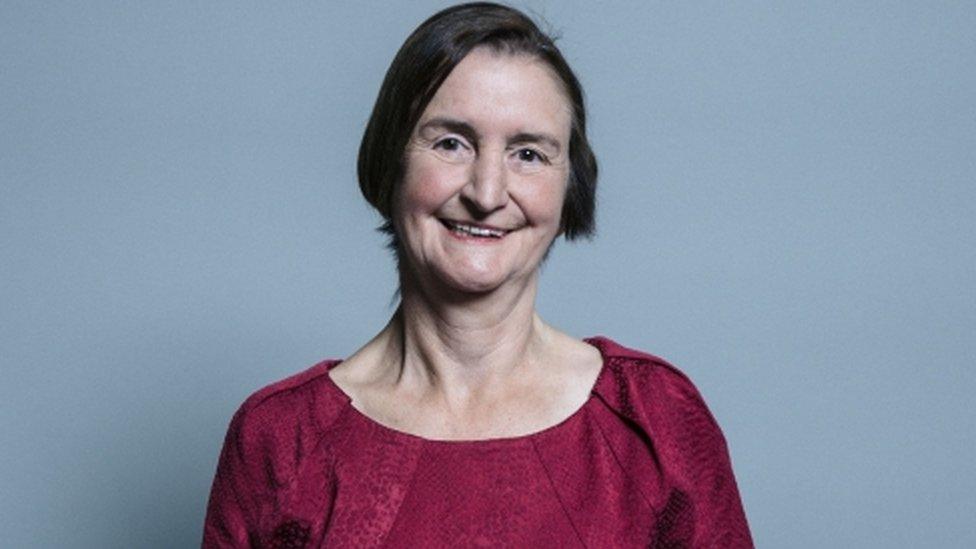Jeremy Corbyn: Salisbury attack 'evidence points towards Russia'
- Published
Corbyn: Evidence points towards Russia
Jeremy Corbyn said the "evidence points towards Russia" being responsible for the Salisbury attack but he did not go as far as his shadow defence secretary.
The Labour leader defended asking questions about the situation during Commons exchanges, saying "that's what oppositions are there for".
He said the source of the chemical weapon used "appears to be Russia".
Earlier, his shadow defence secretary Nia Griffith said the party accepted "Russia was responsible".
Russian former spy Sergei Skripal, 66, and daughter Yulia Skripal, 33, remain critically ill in hospital, 11 days after they were found unconscious on a bench in Salisbury, Wiltshire.
Theresa May told the Commons that Russia was "culpable" for the attack and that she was expelling 23 Russian diplomats - but Moscow has denied all involvement.
What did Mr Corbyn say in the Commons?
The Labour leader condemned the "appalling" attack but pressed the PM on whether the UK had supplied traces of the nerve agent used in the attack to Russia for analysis before Wednesday's deadline, as the Kremlin had asked.
And he asked what action the UK was taking with its allies through the Organisation for the Prevention of Chemical Weapons.
The UK's response, said the Labour leader, should be underpinned by support for the rule of law and international agreements and respect for human rights.
But in a later Facebook post, Mr Corbyn called for the Russian authorities to "be held to account on the basis of the evidence and our response must be both decisive and proportionate".
Why has this caused a problem?
A succession of Labour MPs - including some who have opposed Mr Corbyn as Labour leader - called for him to be firmer in his condemnation of Russia.
They also backed Mrs May's response to the attack, including the expulsion of the Russian diplomats.

Nia Griffith says Labour accepts what the prime minister has said and that Russia is responsible.
Speaking on BBC Radio 4's Today programme, Shadow Defence Secretary Ms Griffith said: "We very much accept what the prime minister said - this is a very sophisticated nerve agent and Russia is responsible for this attack and therefore we're fully supporting the measures which the government is taking, including the expulsion of 23 diplomats."
Asked if she was at odds with Mr Corbyn on the issue, Ms Griffith said she was more "plain speaking" than her leader and said he had made it clear in "the subsequent statement that he put out" on Wednesday evening that Labour was "fully supportive" of the government's actions.
"I think the important thing is that is our position now," she added.
According to The Sun, external, shadow foreign secretary Emily Thornberry also backed the PM's stance, arguing that Russia has "to face the consequences".
Speaking at a London seminar on Wednesday, she said: "We utterly condemn this despicable act and support all the measures taken by the government today in response to it."
What has Mr Corbyn said since?
Asked on Thursday about his tone during Commons exchanges, Mr Corbyn said he was "extremely definite" in his response to Mrs May.
He said he totally condemned the attack and said "that the perpetrators must be brought to justice, that the international chemical weapons convention must be invoked, and the source of this weapon, which appears to be Russia, either from the state or from a rogue element of the state, must be brought to justice as a result of it".
He added: "The evidence points towards Russia on this, therefore the responsibility must be borne by those that made the weapon, those that brought the weapon into the country and those that used the weapon.
"What I was asking was questions about the identity of the weapon, the reference to the weapons convention and also the support of other allies in this."
But in an article in the Guardian newspaper, external, he warned against "hasty judgements that could lead to a new cold war" and said it was for the police and security services to determine whether the Russian state, or "Russian mafia-like groups that have been allowed to gain a toehold in Britain" were responsible.
He wrote: "Flawed intelligence and dodgy dossiers led to the calamity of the Iraq invasion. There was overwhelming bipartisan support for attacking Libya, but it proved to be wrong. A universal repugnance at the 9/11 attacks led to a war on Afghanistan that continues to this day, while terrorism has spread across the globe."
What did Mr Corbyn's spokesman say?
The Labour leader's strategy and communications director said on Wednesday Labour did not oppose any of the measures outlined by Mrs May - including the expulsions - but urged caution over reaching a definitive judgement on who was behind the attack.
He said the most likely explanation was Russia that was "directly or indirectly responsible" for the attack but "culpability takes many forms".
He pointed to the "problematic history" of UK intelligence on chemical weapons.
He said there was "a series of possibilities as to who may be responsible", including oligarchs, Mafia elements and other ex-Soviet states.
In a reference to intelligence failings before the Iraq War, he added: "There is a history between weapons of mass destruction and intelligence which is problematic, to put it mildly,"
Ms Griffith said she "can't speak for Seumas Milne", adding that Jeremy Corbyn's spokesman "has to speak for himself".